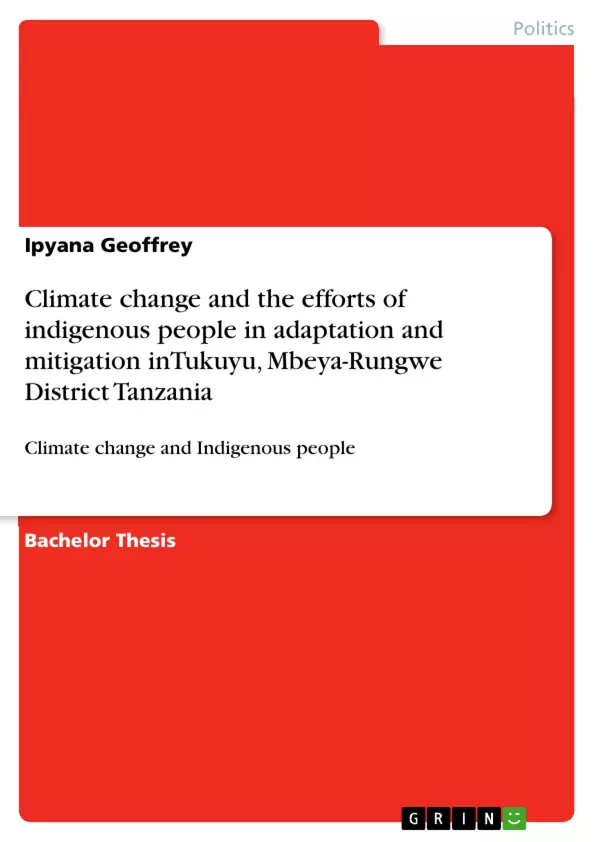Normally at the absolute bottom of the social strata, whether in rich or poor countries, are the indigenous or native peoples who are generally the least powerful, most neglected groups in the world.
In many countries these indigenous people are repressed by traditional caste systems, discriminatory laws, economics, or prejudice. Unique cultures are disappearing along with biological diversity as natural habitats are destroyed to satisfy industrialised world appetites for resources. According to Nyong and Kanaroglou indigenous people are the more vulnerable to climate change impacts (Nyong and Kanaroglou 1999), thus there is need to consider their culture and their knowledge using to adapt and mitigate effects of climate change since they are cost effective and can easily be implemented.
The aim of this research was to identify indigenous and local observations, knowledge and practices related to understanding climate change impacts, adaptation and mitigation in Tukuyu.
The study showed that indigenous knowledge and practices used in adaptation and mitigation of climate change include mixed farming and multiple cropping, zero tilling practices in cultivation, contour farming, mulching, adjustments to planting dates, planting trees along water sources and Land buffer zone on sacred forests. The most knowledgeable people were teachers, followed by farmers, then students and business men/women were the least knowledgeable groups.
I recommend that there should be community awareness and education through the help of Non Governmental Organisation (NGOs), Community Based Organisations (CBOs) and the government also the government to take more steps forward to promote indigenous and local knowledge used to fight climate change so as to help indigenous people to be less vulnerable to impacts of climate change.
Inhaltsverzeichnis (Table of Contents)
- CHAPTER ONE
- 1.0 Introduction
- 1.1 Background of the study
- 1.2 Statement of the problem
- 1.3 Objectives of the study
- 1.3.1 General objective
- 1.3.2 Specific objectives
- 1.4 Research questions
- 1.5 Conceptual framework
- 1.6 Scope of the study
- 1.7 Significance of the study
- 1.8 Expected challenges
- CHAPTER TWO
- 2.0 Introduction
- 2.1 What is climate change?
- 2.2 Indigenous people and Climate change
- 2.3 Indigenous people's perceptions on climate change
- 2.4 Some indigenous practices and knowledge used in adaptation and mitigation of the climate change impacts
Zielsetzung und Themenschwerpunkte (Objectives and Key Themes)
This research report examines the impact of climate change on indigenous communities in Tukuyu, Tanzania, focusing on their efforts to adapt and mitigate these changes. The report aims to understand the local perceptions of climate change, the specific impacts experienced by the community, and the traditional knowledge and practices that are being employed to adapt and mitigate these impacts. Key themes explored include:- Climate change impacts on indigenous communities
- Indigenous knowledge and practices in climate change adaptation and mitigation
- The role of traditional knowledge in sustainable development
- The importance of community participation in climate change responses
- Challenges and opportunities for climate change resilience in indigenous communities
Zusammenfassung der Kapitel (Chapter Summaries)
Chapter One: Introduction
This chapter provides an introduction to the research, outlining the background, problem statement, objectives, research questions, conceptual framework, scope, significance, and expected challenges of the study.Chapter Two: Literature Review
This chapter explores the existing literature on climate change, its impacts on indigenous communities, and the role of traditional knowledge in adaptation and mitigation. It also examines indigenous people's perceptions of climate change and the various practices and knowledge they utilize to address the challenges.Frequently Asked Questions
What is the focus of the research in Tukuyu, Tanzania?
The research identifies indigenous and local observations, knowledge, and practices related to climate change impacts, adaptation, and mitigation in the Tukuyu region of the Mbeya-Rungwe District.
Which indigenous practices are used for climate change adaptation in this region?
Key practices include mixed farming, multiple cropping, zero tilling, contour farming, mulching, adjusting planting dates, and planting trees near water sources and sacred forests.
Why are indigenous people particularly vulnerable to climate change?
Indigenous groups are often at the bottom of the social strata, neglected, and repressed by traditional systems or discriminatory laws, making them more susceptible to environmental impacts.
Who were the most knowledgeable groups regarding climate change in the study?
The study found that teachers were the most knowledgeable, followed by farmers and students, while business people were the least knowledgeable group.
What recommendations does the researcher provide to help indigenous communities?
The researcher recommends community awareness through NGOs and CBOs, and government action to promote local knowledge to reduce vulnerability to climate change.
- Citar trabajo
- Ipyana Geoffrey (Autor), 2011, Climate change and the efforts of indigenous people in adaptation and mitigation inTukuyu, Mbeya-Rungwe District Tanzania, Múnich, GRIN Verlag, https://www.grin.com/document/183938



